- Home
- Anthony Trollope
An Old Man's Love
An Old Man's Love Read online
AN OLD MAN'S LOVE
by
ANTHONY TROLLOPE
In Two Volumes
William Blackwood and SonsEdinburgh and LondonMDCCCLXXXIV
NOTE.
This story, "An Old Man's Love," is the last of my father's novels. As I have stated in the preface to his Autobiography, "The Landleaguers" was written after this book, but was never fully completed.
HENRY M. TROLLOPE.
CONTENTS OF VOLUME I
I. MRS BAGGETT II. MR WHITTLESTAFF III. MARY LAWRIE IV. MARY LAWRIE ACCEPTS MR WHITTLESTAFF V. "I SUPPOSE IT WAS A DREAM" VI. JOHN GORDON VII. JOHN GORDON AND MR WHITTLESTAFF VIII. JOHN GORDON AND MARY LAWRIE IX. THE REV MONTAGU BLAKE X. JOHN GORDON AGAIN GOES TO CROKER'S HALL XI. MRS BAGGETT TRUSTS ONLY IN THE FUNDS XII. MR BLAKE'S GOOD NEWS
CONTENTS OF VOLUME II
XIII. AT LITTLE ALRESFORD XIV. MR WHITTLESTAFF IS GOING OUT TO DINNER XV. MR WHITTLESTAFF GOES OUT TO DINNER XVI. MRS BAGGETT'S PHILOSOPHY XVII. MR WHITTLESTAFF MEDITATES A JOURNEY XVIII. MR AND MRS TOOKEY XIX. MR WHITTLESTAFF'S JOURNEY DISCUSSED XX. MR WHITTLESTAFF TAKES HIS JOURNEY XXI. THE GREEN PARK XXII. JOHN GORDON WRITES A LETTER XXIII. AGAIN AT CROKER'S HALL XXIV. CONCLUSION
VOLUME I.
CHAPTER I.
MRS BAGGETT.
Mr William Whittlestaff was strolling very slowly up and down thelong walk at his country seat in Hampshire, thinking of the contentsof a letter which he held crushed up within his trousers' pocket. Healways breakfasted exactly at nine, and the letters were supposed tobe brought to him at a quarter past. The postman was really due athis hall-door at a quarter before nine; but though he had lived inthe same house for above fifteen years, and though he was a man veryanxious to get his letters, he had never yet learned the truth aboutthem. He was satisfied in his ignorance with 9.15 A.M., but on thisoccasion the post-boy, as usual, was ten minutes after that time. MrWhittlestaff had got through his second cup of tea, and was strandedin his chair, having nothing to do, with the empty cup and platesbefore him for the space of two minutes; and, consequently, when hehad sent some terrible message out to the post-boy, and then had readthe one epistle which had arrived on this morning, he thus liberatedhis mind: "I'll be whipped if I will have anything to do with her."But this must not be taken as indicating the actual state of hismind; but simply the condition of anger to which he had been reducedby the post-boy. If any one were to explain to him afterwards that hehad so expressed himself on a subject of such importance, he wouldhave declared of himself that he certainly deserved to be whippedhimself. In order that he might in truth make up his mind on thesubject, he went out with his hat and stick into the long walk, andthere thought out the matter to its conclusion. The letter which heheld in his pocket ran as follows:--
ST. TAWELL'S, NORWICH, February 18--.
MY DEAR MR WHITTLESTAFF,--Poor Mrs Lawrie has gone at last. She died this morning at seven o'clock, and poor Mary is altogether alone in the world. I have asked her to come in among us for a few days at any rate, till the funeral shall be over. But she has refused, knowing, I suppose, how crowded and how small our house is. What is she to do? You know all the circumstances much better than I do. She says herself that she had always been intended for a governess, and that she will, of course, follow out the intention which had been fixed on between her and her father before his death. But it is a most weary prospect, especially for one who has received no direct education for the purpose. She has devoted herself for the last twelve months to Mrs Lawrie, as though she had been her mother. You did not like Mrs Lawrie, nor did I; nor, indeed, did poor Mary love her very dearly. But she, at any rate, did her duty by her step-mother. I know that in regard to actual money you will be generous enough; but do turn the matter over in your mind, and endeavour to think of some future for the poor girl.--Yours very faithfully,
EMMA KING.
It was in answer to such a letter as this, that Mr Whittlestaff haddeclared that "He'd be whipped if he'd have anything to do with her."But that expression, which must not in truth be accepted as meaninganything, must not be supposed to have had even that dim shadow of ameaning which the words may be supposed to bear. He had during thelast three months been asking himself the question as to what shouldbe Mary Lawrie's fate in life when her step-mother should have gone,and had never quite solved the question whether he could or would notbring into his own house, almost as a daughter, a young woman whowas in no way related to him. He had always begun these exercisesof thought, by telling himself that the world was a censorious oldfool, and that he might do just as he pleased as to making any girlhis daughter. But then, before dinner he had generally come to theconclusion that Mrs Baggett would not approve. Mrs Baggett was hishousekeeper, and was to him certainly a person of importance. He hadnot even suggested the idea to Mrs Baggett, and was sure that MrsBaggett would not approve. As to sending Mary Lawrie out into theworld as a governess;--that plan he was quite sure would not answer.
Two years ago had died his best beloved friend, Captain PatrickLawrie. With him we have not anything to do, except to say that ofall men he was the most impecunious. Late in life he had marrieda second wife,--a woman who was hard, sharp, and possessed of anannuity. The future condition of his only daughter had been aterrible grief to him; but from Mr Whittlestaff he had receivedassurances which had somewhat comforted him. "She shan't want. Ican't say anything further." Such had been the comfort given by MrWhittlestaff. And since his friend's death Mr Whittlestaff had beenliberal with presents,--which Mary had taken most unwillingly underher step-mother's guidance. Such had been the state of things whenMr Whittlestaff received the letter. When he had been walking upand down the long walk for an extra hour, Mr Whittlestaff expressedaloud the conclusion to which he had come. "I don't care one strawfor Mrs Baggett." It should be understood as having been uttered indirect opposition to the first assurance made by him, that "He'd bewhipped if he'd have anything to do with her." In that hour he hadresolved that Mary Lawrie should come to him, and be made, with allpossible honours of ownership, with all its privileges and all itsresponsibilities, the mistress of his house. And he made up his mindalso that such had ever been his determination. He was fifty and MaryLawrie was twenty-five. "I can do just what I please with her," hesaid to himself, "as though she were my own girl." By this he meantto imply that he would not be expected to fall in love with her, andthat it was quite out of the question that she should fall in lovewith him. "Go and tell Mrs Baggett that I'll be much obliged to herif she'll put on her bonnet and come out to me here." This he said toa gardener's boy, and the order was not at all an unusual one. Whenhe wanted to learn what Mrs Baggett intended to give him for dinner,he would send for the old housekeeper and take a walk with her fortwenty minutes. Habit had made Mrs Baggett quite accustomed to theproceeding, which upon the whole she enjoyed. She now appeared witha bonnet, and a wadded cloak which her master had given her. "It'sabout that letter, sir," said Mrs Baggett.
"How do you know?"
"Didn't I see the handwriting, and the black edges? Mrs Lawrie ain'tno more."
"Mrs Lawrie has gone to her long account."
"I'm afeared, sir, she won't find it easy to settle the bill,"said Mrs Baggett, who had a sharp, cynical way of expressing herdisapprobation.
"Mrs Baggett, judge not, lest you be judged." Mrs Baggett turned upher nose and snuffed the air. "The woman has gone, and nothing shallbe said against her here. The girl remains. Now, I'll tell you what Imean to do."
"She isn't to come here, Mr Whittlestaff?"
"Here she is to come, and here she is to remain, and here she is tohave her part of everything as tho
ugh she were my own daughter. And,as not the smallest portion of the good things that is to come toher, she is to have her share in your heart, Mrs Baggett."
"I don't know nothing about my heart, Mr Whittlestaff. Them as findstheir way to my heart has to work their way there. Who's Miss Lawrie,that I'm to be knocked about for a new comer?"
"She is just Mary Lawrie."
"I'm that old that I don't feel like having a young missus put overme. And it ain't for your good, Mr Whittlestaff. You ain't a youngman--nor you ain't an old un; and she ain't no relations to you.That's the worst part of it. As sure as my name is Dorothy Baggett,you'll be falling in love with her." Then Mrs Baggett, with thesense of the audacity of what she had said, looked him full in theface and violently shook her head.
"Now go in," he said, "and pack my things up for three nights. I'mgoing to Norwich, and I shan't want any dinner. Tell John I shallwant the cart, and he must be ready to go with me to the station at2.15."
"I ought to be ready to cut the tongue out of my head," said MrsBaggett as she returned to the house, "for I might have known it wasthe way to make him start at once."
Not in three days, but before the end of the week, Mr Whittlestaffreturned home, bringing with him a dark-featured tall girl, clothed,of course, in deepest mourning from head to foot. To Mrs Baggett shewas an object of intense interest; because, although she had by nomeans assented to her master's proposal, made on behalf of the younglady, and did tell herself again and again during Mr Whittlestaff'sabsence that she was quite sure that Mary Lawrie was a baggage, yetin her heart she knew it to be impossible that she could go on livingin the house without loving one whom her master loved. With regardto most of those concerned in the household, she had her own way.Unless she would favour the groom, and the gardener, and the boy,and the girls who served below her, Mr Whittlestaff would hardly becontented with those subordinates. He was the easiest master underwhom a servant could live. But his favour had to be won through MrsBaggett's smiles. During the last two years, however, there had beenenough of discussion about Mary Lawrie to convince Mrs Baggett that,in regard to this "interloper," as Mrs Baggett had once called her,Mr Whittlestaff intended to have his own way. Such being the case,Mrs Baggett was most anxious to know whether the young lady was suchas she could love.
Strangely enough, when the young lady had come, Mrs Baggett, fortwelve months, could not quite make up her mind. The young lady wasvery different from what she had expected. Of interference in thehouse there was almost literally none. Mary had evidently heardmuch of Mrs Baggett's virtues,--and infirmities,--and seemed tounderstand that she also had in many things to place herself underMrs Baggett's orders. "Lord love you, Miss Mary," she was heardto say; "as if we did not all understand that you was to be missusof everything at Croker's Hall,"--for such was the name of MrWhittlestaff's house. But those who heard it knew that the wordswere spoken in supreme good humour, and judged from that, that MrsBaggett's heart had been won. But Mrs Baggett still had her fears;and was not yet resolved but that it might be her duty to turnagainst Mary Lawrie with all the violence in her power. For the firstmonth or two after the young lady's arrival, she had almost madeup her mind that Mary Lawrie would never consent to become MrsWhittlestaff. An old gentleman will seldom fall in love without someencouragement; or at any rate, will not tell his love. Mary Lawriewas as cold to him as though he had been seventy-five instead offifty. And she was also as dutiful,--by which she showed Mrs Baggettmore strongly even than by her coldness, that any idea of marriagewas on her part out of the question.
This, strange to say, Mrs Baggett resented. For though she certainlyfelt, as would do any ordinary Mrs Baggett in her position, that awife would be altogether detrimental to her interest in life, yet shecould not endure to think that "a little stuck-up minx, taken in fromcharity," should run counter to any of her master's wishes. On one ortwo occasions she had spoken to Mr Whittlestaff respecting the younglady and had been cruelly snubbed. This certainly did not creategood humour on her part, and she began to fancy herself angry in thatthe young lady was so ceremonious with her master. But as months ranby she felt that Mary was thawing, and that Mr Whittlestaff wasbecoming more affectionate. Of course there were periods in which hermind veered round. But at the end of the year Mrs Baggett certainlydid wish that the young lady should marry her old master. "I cango down to Portsmouth," she said to the baker, who was a mostrespectable old man, and was nearer to Mrs Baggett's confidencethan any one else except her master, "and weary out the rest on 'emthere." When she spoke of "wearying out the rest on 'em," her friendperfectly understood that she alluded to what years she might stillhave to live, and to the abject misery of her latter days, whichwould be the consequence of her resigning her present mode of life.Mrs Baggett was supposed to have been born at Portsmouth, and,therefore, to allude to that one place which she knew in the worldover and beyond the residences in which her master and her master'sfamily had resided.
Before I go on to describe the characters of Mr Whittlestaff andMiss Lawrie, I must devote a few words to the early life of MrsBaggett. Dorothy Tedcaster had been born in the house of AdmiralWhittlestaff, the officer in command at the Portsmouth dockyard.There her father or her mother had family connections, to visit whomDorothy, when a young woman, had returned from the then abode of herloving mistress, Mrs Whittlestaff. With Mrs Whittlestaff she hadlived absolutely from the hour of her birth, and of Mrs Whittlestaffher mind was so full, that she did conceive her to be superior, ifnot absolutely in rank, at any rate in all the graces and favours oflife, to her Majesty and all the royal family. Dorothy in an evilhour went back to Portsmouth, and there encountered that worst ofmilitary heroes, Sergeant Baggett. With many lamentations, andconfessions as to her own weakness, she wrote to her mistress,acknowledging that she did intend to marry "B." Mrs Whittlestaffcould do nothing to prevent it, and Dorothy did marry "B." Of themisery and ill-usage, of the dirt and poverty, which poor DorothyBaggett endured during that year, it needs not here to tell. Thatsomething had passed between her and her old mistress when shereturned to her, must, I suppose, have been necessary. But of hermarried life, in subsequent years, Mrs Baggett never spoke at all.Even the baker only knew dimly that there had been a Sergeant Baggettin existence. Years had passed since that bad quarter of an hourin her life, before Mrs Baggett had been made over to her presentmaster. And he, though he probably knew something of the abominableSergeant, never found it necessary to mention his name. For this MrsBaggett was duly thankful, and would declare among all persons, thebaker included, that "for a gentleman to be a gentleman, no gentlemanwas such a gentleman" as her master.
It was now five-and-twenty years since the Admiral had died, andfifteen since his widow had followed him. During the latter periodMrs Baggett had lived at Croker's Hall with Mr Whittlestaff, andwithin that period something had leaked out as to the Sergeant. Howit had come to pass that Mr Whittlestaff's establishment had beenmounted with less of the paraphernalia of wealth than that of hisparents, shall be told in the next chapter; but it was the case thatMrs Baggett, in her very heart of hearts, was deeply grieved at whatshe considered to be the poverty of her master. "You're a stupidold fool, Mrs Baggett," her master would say, when in some privatemoments her regrets would be expressed. "Haven't you got enoughto eat, and a bed to lie on, and an old stocking full of moneysomewhere? What more do you want?"
"A stocking full of money!" she would say, wiping her eyes; "thereain't no such thing. And as for eating, of course, I eats as much asI wants. I eats more than I wants, if you come to that."
"Then you're very greedy."
"But to think that you shouldn't have a man in a black coat to pourout a glass of wine for you, sir!"
"I never drink wine, Mrs Baggett."
"Well, whisky. I suppose a fellow like that wouldn't be above pouringout a glass of whisky for a gentleman;--though there's no knowing nowwhat those fellows won't turn up their noses at. But it's a come-downin the world, Mr Whittlestaff."
"If you th
ink I've come down in the world, you'd better keep it toyourself, and not tell me. I don't think that I've come down."
"You bear up against it finely like a man, sir; but for a poor womanlike me, I do feel it." Such was Mrs Baggett and the record of herlife. But this little conversation took place before the coming ofMary Lawrie.

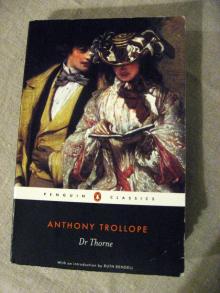 Doctor Thorne
Doctor Thorne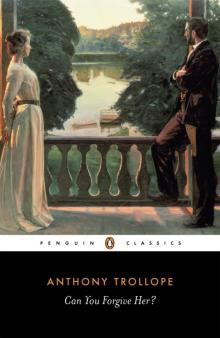 Can You Forgive Her?
Can You Forgive Her?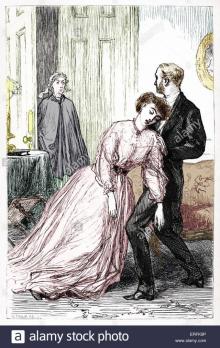 The Last Chronicle of Barset
The Last Chronicle of Barset The Fixed Period
The Fixed Period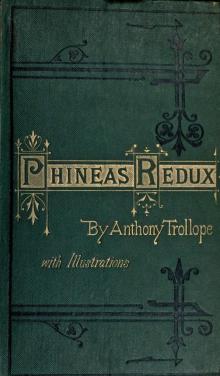 Phineas Redux
Phineas Redux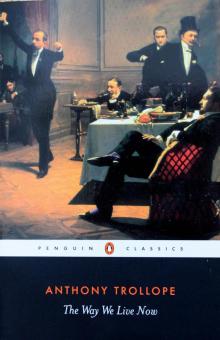 The Way We Live Now
The Way We Live Now Castle Richmond
Castle Richmond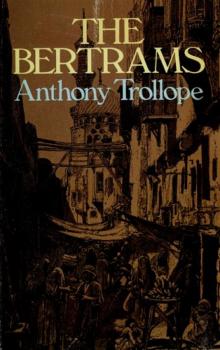 The Bertrams
The Bertrams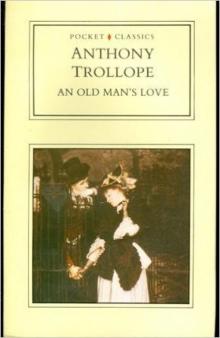 An Old Man's Love
An Old Man's Love The Belton Estate
The Belton Estate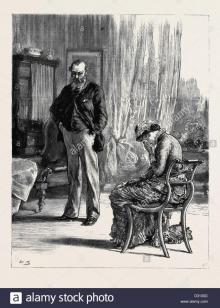 Marion Fay: A Novel
Marion Fay: A Novel The Claverings
The Claverings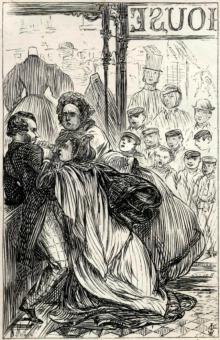 The Struggles of Brown, Jones, and Robinson
The Struggles of Brown, Jones, and Robinson Nina Balatka
Nina Balatka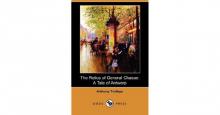 The Relics of General Chasse: A Tale of Antwerp
The Relics of General Chasse: A Tale of Antwerp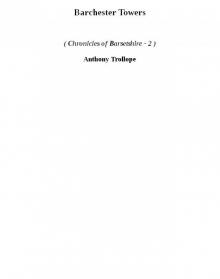 Barchester Towers cob-2
Barchester Towers cob-2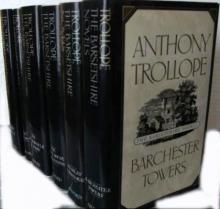 The Chronicles of Barsetshire
The Chronicles of Barsetshire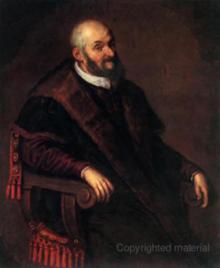 The Warden cob-1
The Warden cob-1 Framley Parsonage
Framley Parsonage Christmas at Thompson Hall
Christmas at Thompson Hall The Warden
The Warden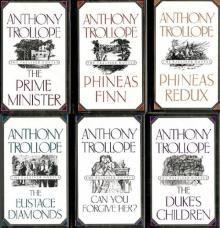 The Palliser Novels
The Palliser Novels The Small House at Allington
The Small House at Allington Barchester Towers
Barchester Towers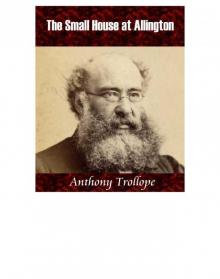 The Small House at Allington cob-5
The Small House at Allington cob-5 The Duke's Children
The Duke's Children Phineas Finn, the Irish Member
Phineas Finn, the Irish Member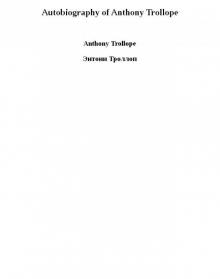 Autobiography of Anthony Trollope
Autobiography of Anthony Trollope